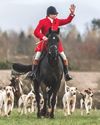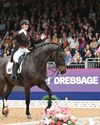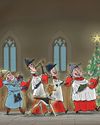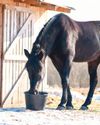
RECOVERY from surgery or a significant injury or illness often involves a period of box rest or confinement in a stable-sized pen. This may be for as little as 24 hours following a routine joint injection, or six months or more in the case of a fracture.
Uncontrolled movement greatly impairs tissue healing. By restricting movement, box rest reduces the strain on wound edges, allowing healing to occur. Excessive movement disrupts tendon and ligament healing, making reinjury more likely when the horse returns to work.
The types of box rest are:
Simple confinement to a loosebox (or pen) - this is the most common form.
● Confinement to a loosebox and tethering in the box - this stops the horse lying down and now is used only very rarely, for example for pelvic fractures.
● Confinement to a small yard or very small paddock. This allows limited movement by walking only and is useful in the rehabilitation stage.
● Box rest followed by in-hand walking this allows controlled mobilisation and loading of healing tissues, in turn allowing gradual strengthening.
Horses are highly social animals accustomed to being able to move freely, and unhappy horses can become ill due to confinement. However, most resign themselves to box rest quickly, if well managed.
MANAGING BOX REST
Feeding
●Reduce hard feed to a minimum. The best option is low-calorie chaff with a handful of nuts or coarse mix added. Feed chaff generously - the act of feeding seems to provide some psychological comfort for the horse. Half a bucket of chaff two or three times a day is ideal. However, check with your vet if a specific diet or supplement is appropriate.
● Ensure constant access to hay or haylage. Natural foraging behaviour can be mimicked by giving different forages in different areas of the box haylage in one; hay in another.
Denne historien er fra November 02, 2023-utgaven av Horse & Hound.
Start din 7-dagers gratis prøveperiode på Magzter GOLD for å få tilgang til tusenvis av utvalgte premiumhistorier og 9000+ magasiner og aviser.
Allerede abonnent ? Logg på
Denne historien er fra November 02, 2023-utgaven av Horse & Hound.
Start din 7-dagers gratis prøveperiode på Magzter GOLD for å få tilgang til tusenvis av utvalgte premiumhistorier og 9000+ magasiner og aviser.
Allerede abonnent? Logg på

'He's a terrier - a very classy terrier'
Jonbon emulates some legendary chasers as a dual Tingle Creek victor, and trainer Dan Skelton scores a seasonal century

Rupert
This beautiful master's horse hates quad bikes and is \"scared of his rug\" but is dearly loved by both Nigel Peel and his son Jamie

London's landmark moments
What makes London so special for dressage fans? Oscar Williams delves into its unique history, speaking to experts about their most treasured memories and the show's remarkable evolution in the sport

Golden oldies take centre stage
The finals at London International are among the most regarded championships on the senior showing circuit. Alex Robinson investigates the finals and what's contributed to their popularity

Winter wrapped up
With the long-range weather forecast suggesting a chilly winter ahead, how can equestrians prepare for the challenges of frost, ice and snow? Stephanie Bateman finds out

Party time
From Whitaker vs Whitaker football matches to a hunting choir roaring carols, top riders know how to let their hair down at Christmastime. Netia Walker unearths the best festive parties

Rocking their world
Rocking horses were once a common fixture in children's playrooms - or a charming trinket on a Christmas tree. Now, some are getting a new lease of life for grown-up enthusiasts, finds Liz Falkingham

Winter watering
Maintaining a horse's water intake is crucial, but can be tricky in the colder months. Karen Coumbe MRCVS explains why, and how to help

Shetland Pony Grand National organiser
Sebastian Garner on whittling down applicants, playing headmaster and the joy of watching Shetlands at full lick

Peder Fredricson
The Swedish flagbearer and four-time Olympic medallist tells Jennifer Donald about 2024's ups and downs, the key to social licence and silver linings